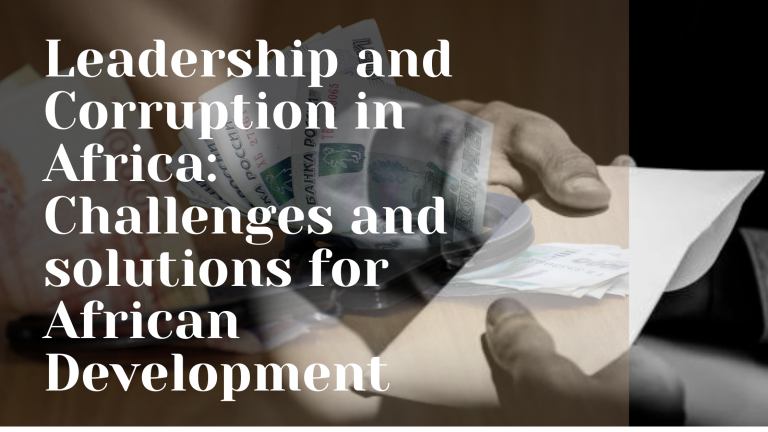Africa is a continent blessed with vast natural and human resources and a rich cultural heritage. Despite the availability of resources in Africa, the continent is significantly struggling with economic hardship due to some factors that need to be urgently addressed. One of the most critical issues affecting African development is the issue of leadership that is significantly diluted by corruption. In this blog post, we will discuss the effects of corruption on African leadership and the possible ways to overcome it.
What are the Challenges?
The issue of corruption in Africa manifests in various forms such as bribery, embezzlement of money, nepotism, and misuse of public funds by public officers. Here are some key challenges associated with leadership and corruption in Africa:
Weak Institutional Frameworks to Counter Corruption
In many African countries, the institutional structure is very unrealistic and lacks the capability to counter corruption. The system of government is very ambiguous, there is a lack of a good judicial system, and no accountability process provides an enabling environment to deal with corruption and a corrupt system. This fosters the level of corruption in Africa.
Unstable Political System
The political system of many African countries is not stable and is diluted with corruption in most of the political processes. The instability of the political system in most African countries promotes corruption and economic hardship on the continent. As a result, the African political system has been struggling with the threat of coups from military officers.
Lack of Transparency and Accountability
A lack of transparency and proper accountability in government operations and public sector activities makes corruption go undetected. In most African countries, government operations are not open and transparent, which hinders the proper oversight of public offices.
Economic Imbalance
In Africa, there is a wide gap between wealthy people and poor individuals due to the high level of economic disparity on the continent. The poor are becoming poorer while rich people are always becoming richer due to high levels of exploitation. This causes an unstoppable increase in the level of corruption in Africa.
Cultural Factors
In some African countries, where culture has a high level of influence, some societal norms and cultures encourage corruption. Patronage systems and familial obligations can influence public officials to prioritise personal relationships over ethical conduct.
Possible Solutions
Addressing the issue of corruption requires multiple approaches that can handle the various factors related to corruption on the continent.
Strengthening Institutions
Enhancing the functionality of various institutions is one of the significant factors that can tackle the issue of corruption in Africa. Strengthening the judicial system, bolstering the power of anti-corruption agencies through the provision of required resources, training, and full autonomy of the institutions.
Promoting Transparency and Accountability
There is a need for the provision and implementation of measures that will promote transparency and accountability to prevent corruption in public offices. These measures may include the implementation of freedom of information laws, adequate utilisation of digital platforms to monitor government activities, and encouraging citizen participation in governance to enhance accountability.
Promoting Political Stability
Enhancing political stability through the promotion of effective democratic processes, such as encouraging the peaceful transition of power, promoting inclusive governance, and providing room for free and fair elections will adequately help in resolving corruption issues in Africa.
Economic Reforms and Poverty Alleviation
Addressing the wide level of economic imbalance through inclusive economic policies and poverty alleviation programmes can reduce the incentive for corrupt behaviour. The provision of equal job opportunities among citizens, equal distribution of resources, and social safety nets can enhance economic stability and reduce vulnerability to corruption.
Education and Awareness
Educating citizens about the negative effects of corruption and promoting ethical behaviour among citizens is crucial. Anti-corruption education programmes, public awareness campaigns, and integrating ethics into school curricula can help shape a culture of integrity and accountability.
Adopting Technology
Adopting technology in the system of government will play a vital role in combating corruption in Africa. The use of technology will enhance transparency in governance and will encourage proper supervision among various institutions of government. This will adequately discourage corruption among individuals and public office holders.
International Cooperation
International intervention is crucial in handling the issue of corruption in Africa. Collaborating with international organisations, sharing best practices, and participating in global anti-corruption initiatives can strengthen efforts to combat corruption at regional and global levels.
Corruption is the enemy of development in Africa and needs urgent action. Addressing the above-mentioned problems related to corruption has become necessary as it will raise the level of economic strength on the continent through the provision of good leadership. Implementing the above suggested solutions is one of the significant efforts that will help in resolving the corruption issues in Africa.



